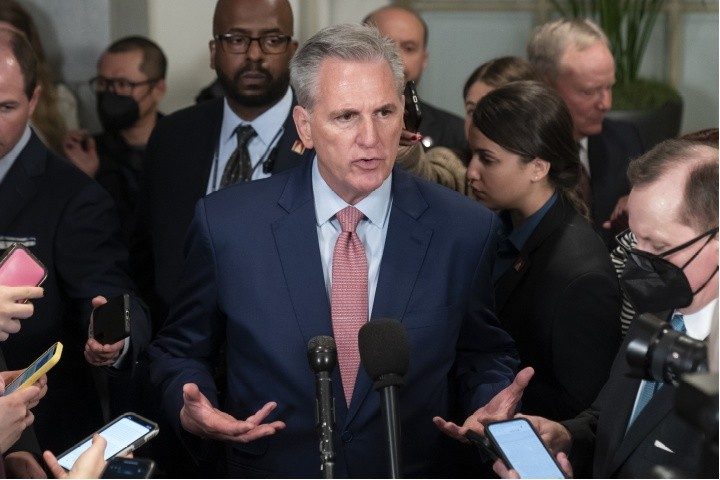
Despite the issuance of new House rules and a conference call by Representative Kevin McCarthy on Sunday night, the number of “Never Kevins” has grown from five to 14 — Andy Biggs (Ariz.); Dan Bishop (N.C.); Andrew Clyde (Ga.); Elijah Crane (Ariz.); Matt Gaetz (Fla.); Bob Good (Va.); Paul Gosar (Ariz.); Andy Harris (Md.); Anna Paulina Luna (Fla.); Ralph Norman (S.C.); Andy Ogles (Tenn.); Scott Perry (Pa.); Matt Rosendale (Mont.); and Chip Roy (Texas).
The proposed rules include giving Republicans a “vote of confidence” rule that would allow five or more members the power to move to “vacate the chair.” The original group of five “Never Kevins” are demanding that that motion may be made by just one member.
The proposed rules also would allow lawmakers to insert in a spending bill moves to reduce and not increase government spending, along with the power to reduce salaries of government officials or to fire them. They include a move to allow lawmakers 72 hours to read a bill before voting on it, and to create a committee to investigate the weaponization of the FBI and the CIA against American citizens.
In addition, they would end proxy voting and Zoom committee meetings. It also would move to put term limits on members of the Office of Congressional Ethics, which would immediately remove all but one Democrat from that committee.
McCarthy himself acceded to demands that he move to oust Homeland Security Secretary Alejandro Mayorkas, and give conservative firebrand Representative Marjorie Taylor Greene (R-Ga.) membership on the coveted Oversight Committee. In addition, McCarthy offered to investigate the “select” January 6 committee, scrutinizing specifically the failure of the committee to address security breakdowns that allowed violence to get out of hand.
In spite of these verbal concessions, there was no movement by the original five “Never Kevins” and precious little that McCarthy was hoping to count on from the other nine. Not long after the late Sunday night conference call, the nine put out a letter to their colleagues announcing that any concessions McCarthy said he would make were still insufficient: “Thus far, there continue to be missing specific commitments with respect to virtually every component of our entreaties, and thus, no means to measure whether promises [by the House Speaker] are [being] kept or broken.”
Adding to McCarthy’s woes was the announcement from the anti-tax group Club for Growth that it would score negatively any member of the party who votes for McCarthy.
The House opens at noon on Tuesday, with the first order of business, after administering the oaths of office to the members, being a vote for speaker of the House. If the vote fails to give McCarthy a majority of those present, it would be the first time since 1923 when the first vote failed to nominate the House speaker. In that year, it took nine ballots before a candidate for speaker gained a majority vote.
Related article:




